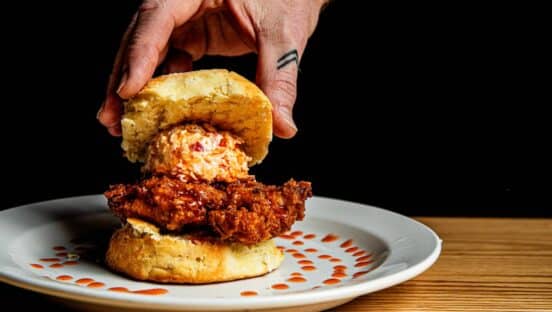Yum! Brands Inc. (NYSE: YUM – News), the world’s largest restaurant company and parent of Taco Bell, Pizza Hut, and KFC, has opened an environmentally-friendly KFC-Taco Bell restaurant in Northampton, Massachusetts. The restaurant is the Company’s first effort to pursue certification under the United States Green Building Council’s LEED (Leadership in Energy and Environmental Design) program.
“The Northampton KFC-Taco Bell is part of our E3 Initiative focusing on the Energy, Environment and Economics of our buildings,” says Jonathan Balas, AIA, LEED AP, KFC Project Architect, the architect who spearheaded and coordinated the project.
Highlights of the restaurant design include reducing carbon footprint, water conservation and quality, and sensible building materials and resources use. The restaurant, designed to use 30 percent less energy and water than a conventional building, also cuts carbon dioxide emissions, reduces waste going to landfills/incinerators, and educates visitors and employees on sustainable design.
In order to reduce its carbon footprint, the restaurant uses solar energy to preheat fresh air coming into the building, which reduces the use of natural gas. Additionally, the restaurant is using a sophisticated lighting control system that maximizes the use of natural light. LED lights, the most energy-efficient available today, were utilized where feasible both inside the restaurant, in the parking lot and on signage. Utilizing more energy-efficient kitchen and building equipment and purchasing renewable energy credits also minimizes the restaurant’s carbon footprint.
Water conservation is a high priority in the new KFC-Taco Bell restaurant. Harvested rainwater is used for irrigation. Fixtures with lower water consumption rates, and a rain garden with filters that improve storm water quality, are in place to address conservation and water use.
Many of the materials used to build the green restaurant, such as counter tops and building insulation, contained recycled content. The wood used during construction was sustainably harvested. The restaurant composts and recycles waste, including enhanced cooking oil reclamation. The building also reduces the environmental impact of new construction and provides a test lab to confirm the feasibility and green performance of new technologies.
Massachusetts is an ideal setting for this ambitious building exploration. Northampton residents have already embraced efforts to reduce society’s environmental footprint on the planet, so the restaurant was a good fit. Customers can cycle to the restaurant utilizing a bicycle path which connects to the parking lot, and patrons driving hybrid cars will enjoy the benefit of preferred parking.



